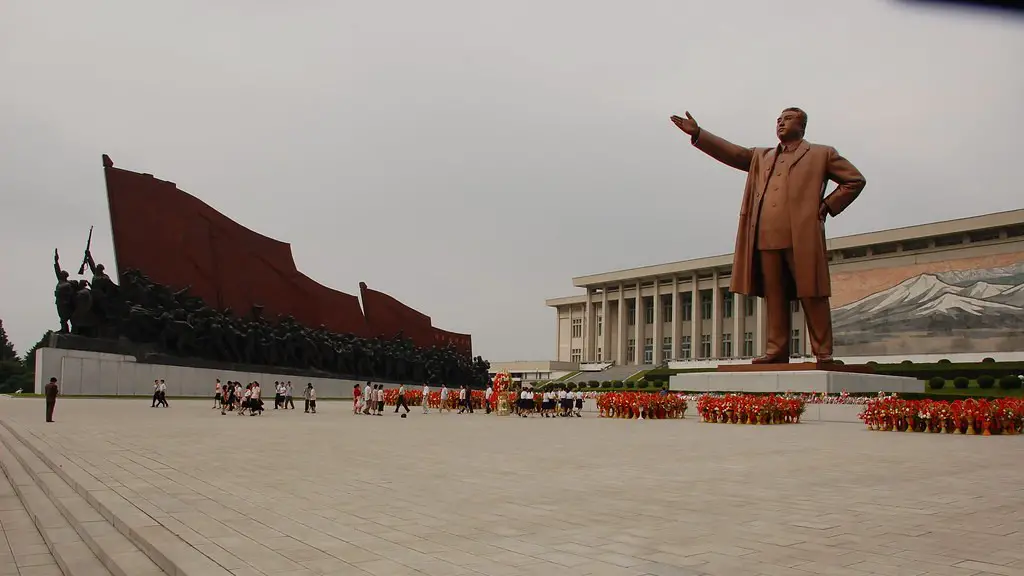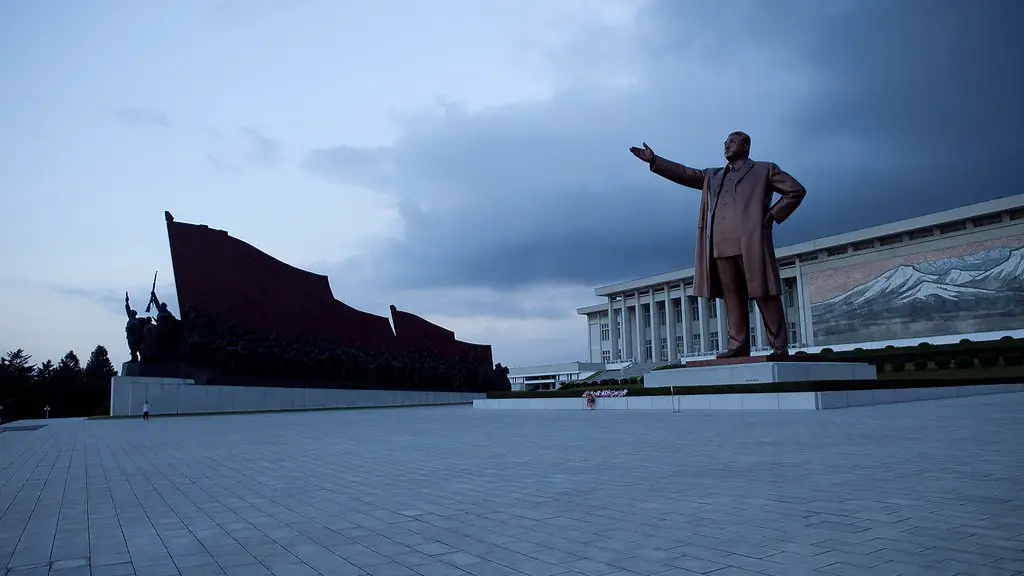As tensions between the United States and North Korea continue to mount, it’s important to understand not only the parties involved and the possible implications of their conflict, but also the history, motivations, and current state of the much-debated relationship between the two nation-states. Discussions around the both nations’ unpredictability and increasing levels of uncertainty and insecurity have become commonplace in recent years, as the state of their relationship appears to be perpetually on the verge of destabilization.
The latest episode began in 2017 when North Korea, a reclusive autocratic regime led by the famously inflexible Kim Jong Un, suddenly began ratcheting up its nuclear and ballistic missile capabilities, tests that would eventually culminate in a series of intercontinental ballistic missiles capable of reaching US soil. Unsurprisingly, the US responded with a hawkish “maximum pressure” campaign, involving financial sanctions, diplomatic isolation, and frequent ultimatums. The Trump administration’s goal has been to compel Kim to comply with US demands and abandon his rapidly growing weapons program.
However, the US’s strategy has proven to be ineffective for several reasons. Most recently, Kim and his administration have begun to take a decidedly more conciliatory tone toward the US, expressing a willingness to negotiate and potentially even pursue denuclearization. Although some political commentators and analysts have argued that this shift in attitude is merely a political ploy by Kim to extract concessions from the US, others believe that it potentially marks the beginning of a new era of bilateral negotiations and cooperation.
At the same time, despite the lessening of tensions in recent years, there remains a high degree of geopolitical uncertainty surrounding the US-North Korean relationship. North Korean leaders have been known to go back on previous agreements and any successful talks that come out of the current negotiations could be invalidated without warning. Moreover, there is still a heavy presence of US forces in the region that could easily be used to disrupt ongoing negotiations, as well as Kim’s various nuclear and ballistic missile tests.
In addition, many experts are actually more concerned about the economic fallout between the two countries than either a nuclear confrontation or an overwhelming military buildup. North Korea is struggling under the weight of US sanctions, and its economy faces imminent collapse if no new economic agreement can be reached. Furthermore, the US has imposed its own economic sanctions that could effectively make it impossible for North Korea to access the necessary resources of its allies, such as China and Russia, who are likely to be crucial to any successful negotiations.
Ultimately, there is no telling what the future may hold in store for the relationship between the US and North Korea. While both sides have certainly made attempts to de-escalate the tension, there is still a great deal of uncertainty and distrust that could easily derail future talks and derail any potential agreement. As such, it is of the utmost importance that both sides remain vigilant and maintain a strong sense of compromise in order to ensure the security and stability of East Asia as a whole.
History
The tensions between the United States and North Korea date back to the Korean War. After the war, both countries found themselves on different sides of the Cold War and their foreign policies further exacerbated their already fragile relationship. US’s decision to establish military bases and deploy troops in South Korea were seen by North Korea as a provocation and a threat, while US’s heavy reliance on economic sanctions also made it difficult for North Korea to access the resources it needed to pursue an independent path.
In the years since, the US and North Korea have struggled to achieve stable relations on a number of occasions. US’s decision to withdraw from the Iran Nuclear Deal in 2018, and subsequent pressure on North Korea to denuclearize, have led to a further deterioration in diplomatic ties. North Korean leaders have accused the US of double standards, while US has responded with a hardline stance and increased financial sanctions.
Since then, the relationship has gone through waves of escalation and de-escalation, with both countries taking steps to both increase and alleviate tensions. The 2018 summit between US President Donald Trump and North Korean leader Kim Jong Un in Singapore saw a reduction in tensions and move towards a harsher, yet somewhat amicable understanding between the two nations. However, North Korea’s increasing nuclear and ballistic missile tests, as well as US sanctions, have led to an increase in tensions over the past two years.
Reactions
Reactions to the US-North Korean conflict from around the world have been mixed, though the consensus appears to be one of apprehension. South Korea, a close US ally, has remained largely silent on the matter, while China and Russia have both voiced their belief that the US should negotiate in good faith with North Korea and have urged both sides to come to an agreeable resolution.
At the same time, US allies in Europe and around the globe have generally been more supportive of the “maximum pressure” campaign, citing the need for North Korea to abandon its nuclear and ballistic missile programs. The United Nations Security Council has also passed a number of resolutions condemning North Korea’s actions, though these have had little impact on the actions of either side.
Ultimately, the way in which the US-North Korean conflict plays out will be determined by the actions of the two countries themselves and how each side chooses to negotiate. This, in turn, will have far-reaching implications for the global balance of power, as well as the security of the Korean Peninsula and nearby countries in East Asia.
Motivations
The motivations of both sides in the US-North Korean conflict remain largely opaque, though both have stated publicly their positions. North Korean leaders have repeatedly alleged that the US’s “maximum pressure” campaign is driven primarily by the need to assert its hegemony in the region, while US leaders have argued that they are simply attempting to eliminate a threat to global security posed by North Korea’s nuclear program.
At the same time, some experts believe that the US’s actions might be more motivated by power politics than actual security concerns. This argument is based on the notion that any US concessions to North Korea could be seen as a sign of weakness and could potentially weaken its ability to project power in the region. Furthermore, US leaders have consistently cited the need for regional stability and open markets as further justification for their hardline stance.
Meanwhile, North Korea’s motivations remain a source of debate, though many analysts believe that the Kim regime is trying to use its nuclear and ballistic missiles programs to gain diplomatic leverage with the US. This is based on the notion that North Korea could potentially use its missile arsenal to engage in nuclear blackmail, forcing the US to make concessions in exchange for North Korea halting or suspending its weapons program.
Implications
The US-North Korean conflict has the potential to cause significant damage to both countries, as well as the larger East Asian region. Economically, North Korea is already struggling under the weight of US sanctions, while any further disruption of its ties with China and Russia could have devastating effects on its already fragile economy. Meanwhile, the US could potentially experience similar economic shocks as a result of potentially devastating financial costs due to any prolonged conflict.
At the same time, any further escalation of tensions could potentially lead to a military confrontation between the two nations, a conflict that could potentially risk the lives of millions of people in the region. While this is an unlikely outcome, the possibility of such a conflict cannot be dismissed, given the volatility of the current situation.
Finally, the US-North Korean conflict could also have significant implications for the global balance of power. The US remains the global hegemon, but if the US is unwilling or unable to contain or prevent North Korea’s nuclear ambitions, this could potentially lead to a shift in the global balance of power as other countries such as China and Russia take a more prominent role and become more assertive in their foreign policies.
Dialogue
Given the high stakes of the US-North Korean relationship, it is of utmost importance that the two sides make efforts to engage in dialogue and reach a peaceful resolution. Ultimately, the future of East Asia and the larger world depends on the ability of the two countries to find a compromise that allows them to coexist peacefully. This means that US and North Korean leaders must be willing to set aside their differences and make compromises in order to resolve their differences and reach a mutually agreeable solution that benefits both sides.
To this end, the US and North Korea have made attempts to initiate dialogue in the past, though none of these efforts have yielded any measurable results. The most recent of these came in the form of US-North Korean talks in 2018, though these talks ultimately ended without any measurable progress. In spite of this setback, it remains essential that both sides continue to engage in meaningful dialogue in order to reach a mutually beneficial resolution.
At the same time, it is important that both sides remain committed to finding a peaceful path forward. Any immediate or premature escalation could prove disastrous for both sides, and it is crucial that any solution remain rooted in communication and mutual understanding.
Possible Solutions
Given the complexity of the US-North Korean relationship, any successful resolution is likely to require compromise from both sides. One possible compromise could involve the dismantling of North Korea’s nuclear and ballistic missile program in exchange for a loosening of US sanctions and increased economic aid to North Korea. This could potentially provide North Korea with sufficient resources to begin rebuilding its economy while maintaining its national security.
At the same time, the US could potentially offer North Korea additional concessions in exchange for the return of certain US military bases in South Korea. This could contribute to reduced military tensions in the region, as well as greater stability and security. Finally, the US could potentially enter into an agreement with North Korea to limit or even reduce the number of nuclear weapons that both sides possess.
Ultimately, the path to resolving the US-North Korean conflict is likely to be difficult and fraught with challenges. While the two countries have expressed their willingness to negotiate and reach a peaceful resolution, there remains significant mistrust between the two sides that could easily prevent any successful negotiations. Nevertheless, it remains essential that both sides remain committed to finding a successful solution that meets the needs of both countries and contributes to the greater security and stability of East Asia.





